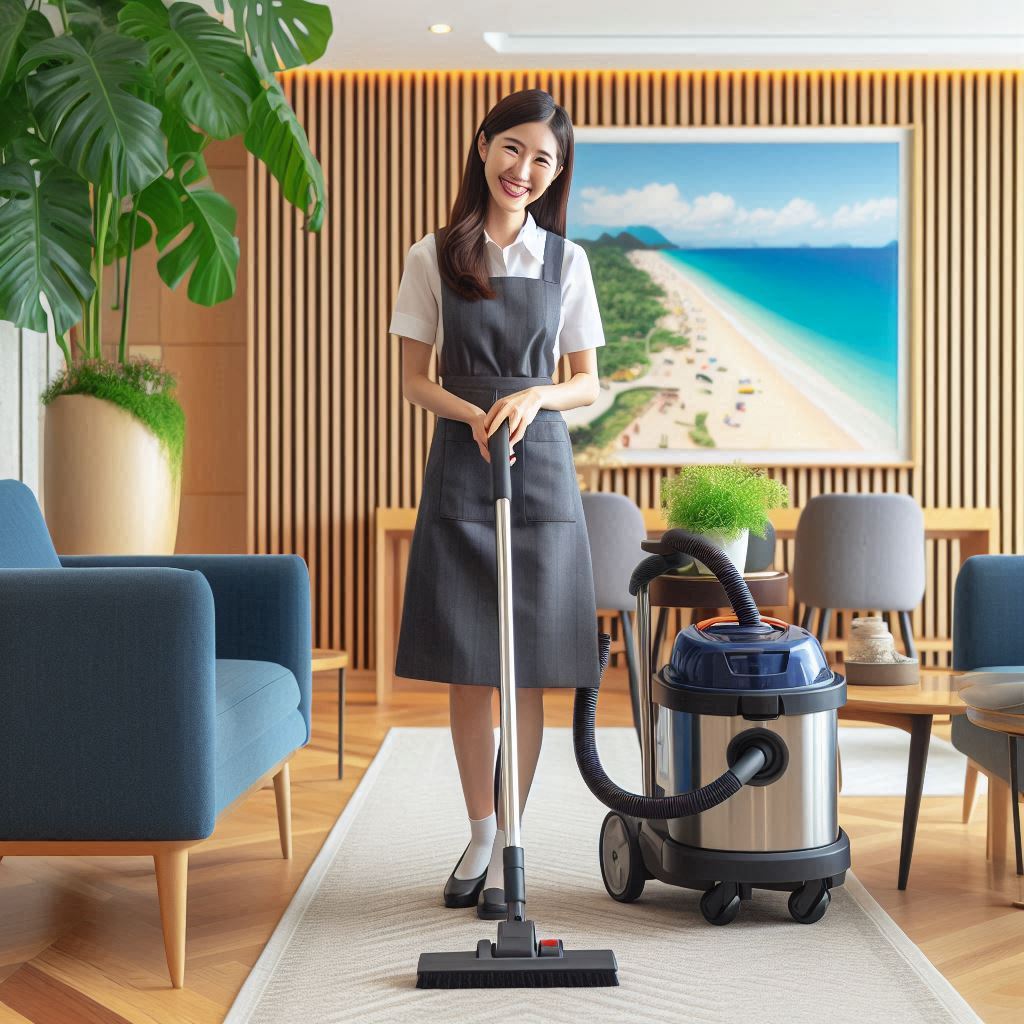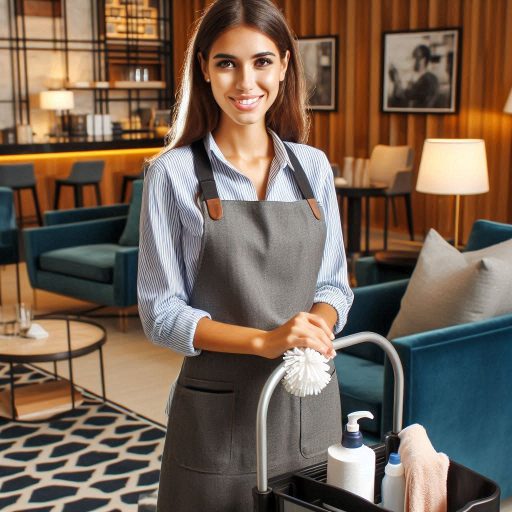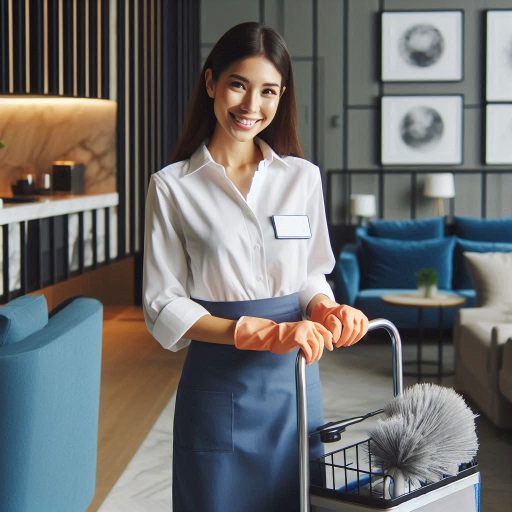Introduction
Housekeepers play a vital role in the hospitality industry, ensuring that hotels remain clean, organized, and welcoming for guests.
Their responsibilities extend beyond simply cleaning rooms; they are essential in maintaining high standards of hygiene, safety, and comfort.
The efforts of housekeepers create a pleasant environment that enhances the overall guest experience.
Without their dedication and hard work, hotels would struggle to meet the expectations of their patrons, ultimately affecting guest satisfaction and loyalty.
Despite their essential contributions, housekeepers face numerous challenges that can impact their performance and well-being.
The demands of the job can often be overwhelming, with housekeepers required to juggle multiple tasks throughout their shifts.
They work under pressure to adhere to strict timelines, cleaning numerous rooms and public areas to ensure everything is spotless.
Additionally, they often contend with high guest expectations, as many visitors anticipate a pristine and immaculate environment upon their arrival.
Moreover, housekeepers frequently encounter issues such as inadequate resources and staffing shortages, which can further complicate their already demanding responsibilities.
Many housekeepers report feeling undervalued and underappreciated, leading to decreased morale and motivation.
This lack of recognition can be disheartening, especially given the physical demands of their work.
Heavy Workloads
How housekeepers often have to clean multiple rooms in a short amount of time
Housekeepers in hotels frequently face heavy workloads each day.
They must clean multiple rooms within a limited timeframe.
This high demand creates intense pressure on the staff.
Often, housekeepers work with tight schedules, making their tasks feel overwhelming.
Cleaning numerous rooms in a short period leads to exhaustion and burnout.
The physical strain this can put on housekeepers
The physical strain on housekeepers can be significant.
They must lift heavy items, push carts, and bend frequently.
These actions can cause fatigue and increase the risk of injury.
Many housekeepers experience back pain and joint issues due to repetitive motions.
This strain affects their health and job performance.
Tired housekeepers may miss details, leading to customer dissatisfaction.
Strategies for hotels to better manage workloads and support their housekeeping staff
To address these challenges, hotels should consider effective workload management strategies.
First, implementing a more balanced room assignment system is essential.
Distributing room assignments evenly among staff helps reduce pressure and fatigue.
Hotels can also schedule regular breaks to allow housekeepers to rest.
Short breaks can significantly enhance productivity and overall job satisfaction.
Another effective strategy involves using technology to streamline processes.
Housekeeping management software can optimize room assignments and track cleaning progress.
This technology allows managers to see which rooms need attention and prioritize them accordingly.
Moreover, using mobile devices can help housekeepers communicate better with the front desk.
Improved communication can lead to more efficient operations.
Hotels can also invest in ergonomic equipment to alleviate physical strain.
Providing comfortable cleaning carts can reduce the effort needed to transport supplies.
Additionally, using lightweight cleaning tools can minimize the physical demands on housekeepers.
Training staff on proper lifting techniques can help prevent injuries.
Furthermore, hotels should prioritize hiring additional housekeeping staff.
Increasing the workforce can help distribute workloads more evenly.
More staff means that each housekeeper has fewer rooms to clean per shift.
This reduction allows housekeepers to focus on quality rather than quantity.
Lastly, hotels should create a supportive work environment.
Acknowledging the hard work of housekeepers can boost morale.
Offering incentives for exceptional performance can motivate staff to maintain high standards.
Regular feedback sessions can also help housekeepers feel valued and supported.
Heavy workloads pose significant challenges for hotel housekeepers.
The physical strain from cleaning multiple rooms can impact their health and job performance.
By implementing balanced room assignments, investing in technology and equipment, hiring additional staff.
Fostering a supportive environment, hotels can better manage workloads.
These strategies will lead to healthier, happier housekeepers and improved guest experiences.
Read: Best Pet Grooming Schools in the United States
Language Barriers
The Issue of Communication Difficulties Between Housekeepers and Non-English Speaking Guests
Language barriers pose significant challenges for housekeepers in hotels.
Many housekeepers encounter non-English speaking guests daily.
This communication difficulty often leads to misunderstandings.
Housekeepers may struggle to understand guests’ needs or preferences.
As a result, this can affect the quality of service provided.
How This Can Lead to Misunderstandings and Affect the Quality of Service
When housekeepers cannot communicate effectively, it can create frustration for both parties.
Guests might feel ignored or unimportant when their requests go unaddressed.
In contrast, housekeepers may feel helpless when unable to assist guests.
These challenges can negatively impact guest satisfaction and the overall hotel experience.
Misunderstandings can arise in various situations.
For instance, a guest might request additional towels or room cleaning.
If a housekeeper misinterprets this request, it can lead to dissatisfaction.
Guests may complain about the lack of service, impacting the hotel’s reputation.
Moreover, language barriers can hinder housekeepers from addressing guest complaints promptly.
Solutions Such as Language Training for Housekeepers or the Use of Translation Devices
To improve communication, hotels must address language barriers effectively.
One solution is to provide language training for housekeepers.
This training can help them learn basic phrases in multiple languages.
Such skills empower housekeepers to communicate better with guests.
When housekeepers feel confident in their language skills, they can deliver enhanced service.
Another effective solution is the use of translation devices.
Hotels can equip housekeepers with portable translation tools.
These devices can facilitate real-time communication between housekeepers and guests.
When housekeepers can translate requests and inquiries instantly, misunderstandings diminish.
This approach ensures that guests receive the service they expect.
Additionally, hotels can create multilingual signage throughout the property.
Providing translated materials in various languages helps guests navigate the hotel easily.
This strategy reduces confusion and improves the overall experience for non-English speaking guests.
Clear instructions regarding services or amenities can also enhance guest satisfaction.
Furthermore, hotels can establish a culture of inclusivity and diversity.
Encouraging staff to learn about different cultures fosters understanding and respect.
When housekeepers appreciate diverse backgrounds, they become more empathetic toward guests.
This empathy translates into better service and improved guest experiences.
Language barriers present notable challenges for hotel housekeepers.
Miscommunication can lead to misunderstandings and affect service quality.
Implementing solutions like language training and translation devices can bridge these gaps.
By prioritizing effective communication, hotels can enhance guest satisfaction and ensure a memorable experience for all visitors.
Investing in these solutions benefits both guests and housekeepers alike.
Read: Finding the Right Work-Life Balance as a Nail Tech
Time Constraints
How Housekeepers Are Often Under Pressure to Clean Rooms Quickly to Meet Guest Demands
Time constraints pose significant challenges for housekeepers in hotels.
Housekeepers often work under immense pressure to clean rooms quickly.
They must meet strict check-in times while ensuring guest satisfaction.
This pressure can lead to rushed cleaning processes, impacting service quality.
Housekeepers frequently face back-to-back room assignments, leaving little time for thorough cleaning.
The Impact of Time Constraints on the Thoroughness of Cleaning
The impact of time constraints on cleaning thoroughness cannot be overlooked.
When housekeepers hurry to complete their tasks, they may skip essential steps.
Areas like bathrooms and kitchenettes may receive inadequate attention.
As a result, rooms may not meet the cleanliness standards expected by guests.
This situation can lead to guest complaints and dissatisfaction, ultimately affecting hotel reputation.
Additionally, rushing through cleaning can also lead to safety issues.
For instance, housekeepers might overlook hazards like spills or debris left in hallways.
This negligence can create unsafe environments for both guests and staff.
A lack of thoroughness can diminish the overall guest experience, affecting repeat business.
Suggestions for Hotels to Allocate More Time for Housekeepers to Do Their Job Effectively
To address these challenges, hotels must prioritize allocating more time for housekeepers.
One effective approach is to analyze room turnover rates and adjust staff schedules accordingly.
By understanding peak times and guest flow, hotels can distribute workloads more evenly.
This strategy allows housekeepers to manage their time better while maintaining service quality.
Another suggestion is to implement flexible check-in and check-out times.
By offering staggered times, hotels can reduce the pressure on housekeepers.
This flexibility allows housekeepers to clean rooms thoroughly without the constant rush.
Guests will appreciate the quality of service and the attention to detail.
Additionally, hotels can invest in better training for housekeepers.
Training programs can teach effective time management and cleaning techniques.
When housekeepers feel equipped with the right skills, they can work more efficiently.
This training can improve both the speed and thoroughness of their work.
Moreover, hotels should consider investing in quality cleaning supplies and equipment.
Modern tools can help housekeepers perform their tasks more efficiently.
For example, high-quality vacuum cleaners can speed up the cleaning process.
Effective cleaning agents can ensure that rooms are sanitized properly without extended effort.
Time constraints significantly impact the effectiveness of hotel housekeeping.
Rushed cleaning processes can lead to inadequate service and guest dissatisfaction.
By implementing strategies such as adjusting schedules, offering flexible check-in times, and providing better training, hotels can enhance housekeeping efficiency.
Prioritizing these changes benefits both housekeepers and guests, leading to a more positive hotel experience.
Read: Steps to Become a Professional Pet Groomer in the USA
Lack of Resources
The Challenges Housekeepers Face When Hotels Provide Insufficient Cleaning Supplies or Equipment
Housekeepers often face significant challenges due to a lack of resources.
Insufficient cleaning supplies and equipment can hinder their ability to perform effectively.
For instance, if housekeepers do not have enough cleaning solutions or tools, they may struggle to maintain standards.
Inadequate equipment can lead to longer cleaning times and increased frustration.
This situation can diminish the overall morale of the housekeeping team.
Additionally, a lack of essential items, such as towels, linens, or trash bags, can complicate their tasks.
Housekeepers may have to make multiple trips to restock supplies, wasting valuable time.
These delays can affect the timely preparation of rooms for incoming guests.
When resources are scarce, housekeepers cannot perform their duties to the best of their abilities.
How This Can Affect the Quality of Cleanliness and Efficiency of Housekeeping Tasks
The quality of cleanliness in hotel rooms can suffer due to inadequate resources.
Without the proper cleaning supplies, housekeepers may resort to subpar methods.
For example, they might dilute cleaning products to stretch supplies, which can reduce effectiveness.
Consequently, guests may encounter issues like unclean bathrooms or improperly sanitized surfaces.
Moreover, efficiency is directly impacted when housekeepers lack essential tools.
Cleaning tasks may take longer, resulting in increased pressure to complete room turnover.
This inefficiency can lead to burnout among staff, which further diminishes service quality.
Ultimately, guests may notice the decline in cleanliness and become dissatisfied with their experience.
Solutions Such as Investing in Better Equipment and Ensuring an Adequate Supply of Cleaning Materials
To address these challenges, hotels must prioritize investing in better equipment and supplies.
Upgrading cleaning tools can significantly enhance the effectiveness of housekeeping tasks.
For example, high-efficiency vacuum cleaners and microfiber cloths can improve cleanliness.
These tools not only save time but also ensure a higher standard of cleanliness.
Additionally, hotels should establish a reliable system for monitoring cleaning supplies.
Keeping track of inventory levels helps ensure that housekeepers have access to necessary materials.
Regularly replenishing stock prevents shortages and minimizes disruptions in workflow.
This proactive approach can maintain high cleanliness standards and improve staff morale.
Training is another vital component of resource management.
Hotels can educate housekeepers on the proper use of cleaning supplies and equipment.
When housekeepers understand how to use tools effectively, they can perform their tasks more efficiently.
This training can lead to better results and reduced waste of supplies.
Furthermore, hotels can engage housekeepers in discussions about their resource needs.
Listening to their feedback allows management to identify gaps in supplies and equipment.
This collaboration fosters a sense of teamwork and helps ensure that housekeepers feel valued.
A lack of resources poses significant challenges for hotel housekeepers.
Insufficient cleaning supplies and equipment can hinder both cleanliness and efficiency.
By investing in better tools and implementing effective inventory management, hotels can enhance housekeeping performance.
Prioritizing these solutions ultimately leads to a more satisfying experience for both staff and guests.
Read: Essential Skills Every Pet Groomer Should Have

Occupational Hazards
The Potential Risks That Housekeepers Face
Housekeepers in hotels encounter various occupational hazards daily.
One significant risk is injury from lifting heavy objects, such as mattresses or furniture.
Repetitive motions, like bending and stretching, can lead to musculoskeletal injuries.
Additionally, housekeepers often handle hazardous cleaning chemicals, which can pose health risks if not managed properly.
Exposure to these substances can cause skin irritations or respiratory issues.
Other potential hazards include slips, trips, and falls while navigating wet or cluttered areas.
These incidents can result in serious injuries, impacting a housekeeper’s ability to work.
Furthermore, emotional stress from high workloads can also affect their mental health, leading to burnout.
Recognizing these risks is crucial for ensuring a safe working environment.
The Importance of Prioritizing Safety Measures and Training for Housekeeping Staff
Prioritizing safety measures is essential for protecting housekeeping staff.
Implementing comprehensive safety protocols reduces the likelihood of accidents and injuries.
Hotels must provide proper training to housekeepers on safe lifting techniques and ergonomic practices.
When staff understand how to handle heavy items safely, the risk of injury decreases significantly.
Additionally, training on the safe handling of cleaning chemicals is vital.
Housekeepers should know how to read labels, use protective gear, and store hazardous substances properly.
Awareness of potential risks helps employees make informed decisions, ultimately enhancing their safety.
Moreover, a focus on safety can improve overall job satisfaction, reducing turnover rates in the housekeeping department.
Examples of Best Practices for Hotels to Create a Safe Working Environment for Their Housekeepers
Hotels can adopt several best practices to create a safe working environment for housekeepers.
First, they should invest in ergonomic equipment and tools.
For instance, using adjustable carts can minimize lifting and reaching.
Providing vacuum cleaners with lightweight designs can also help reduce strain during cleaning tasks.
Regular safety audits are another essential practice.
These audits help identify potential hazards within the workplace.
Hotels can use the findings to address safety concerns proactively.
Creating a safety committee that includes housekeeping staff allows for ongoing discussions about safety measures and improvements.
Additionally, implementing a robust training program is crucial.
Hotels can conduct regular workshops on safety practices and injury prevention.
These sessions can cover topics such as proper lifting techniques, the safe use of cleaning chemicals, and fall prevention strategies.
Regularly refreshing training ensures that housekeepers stay informed about best practices.
Moreover, hotels should provide personal protective equipment (PPE) for housekeepers.
Items such as gloves, masks, and non-slip shoes can protect staff from potential hazards.
Ensuring that employees have access to the necessary gear promotes a culture of safety.
Occupational hazards pose significant risks for hotel housekeepers.
Injuries from lifting heavy objects and exposure to hazardous chemicals can impact their health.
By prioritizing safety measures and training, hotels can create a safer working environment.
Implementing best practices like ergonomic tools, safety audits, and ongoing training ultimately enhances staff well-being and job satisfaction.
A commitment to safety benefits both housekeepers and the overall success of the hotel.
Transform Your Career Today
Unlock a personalized career strategy that drives real results. Get tailored advice and a roadmap designed just for you.
Start NowGuest Misconduct
The Challenges Housekeepers Encounter When Guests Are Disrespectful or Uncooperative
Housekeepers often face difficult situations when guests behave disrespectfully or uncooperatively.
This misconduct may involve guests refusing to allow housekeepers to enter or clean their rooms, even during scheduled cleaning times.
In some cases, guests might leave rooms in extremely poor conditions, making the job more difficult.
Verbal abuse, rudeness, or a lack of common courtesy are other challenges that housekeepers may encounter, which can make their tasks more stressful and unpleasant.
These situations disrupt the housekeeper’s schedule and create additional burdens.
Handling rooms that are left in disarray takes more time and effort.
Uncooperative guests can delay cleaning, affecting the smooth operation of housekeeping services and ultimately impacting the guest experience for others as well.
How Guest Misconduct Can Create Additional Stress for Housekeepers
Guest misconduct adds significant stress to housekeepers’ already demanding jobs.
Dealing with rude or uncooperative guests increases their emotional and mental strain.
When housekeepers feel disrespected or unsupported, their morale can drop, leading to decreased job satisfaction.
The pressure to maintain high standards of cleanliness, even in difficult situations, can be overwhelming.
Moreover, guest misconduct may create safety concerns for housekeepers, particularly when entering rooms with unknown or aggressive individuals.
This stress can result in increased anxiety and fatigue, making it harder for housekeepers to perform their duties effectively.
Over time, continuous exposure to such treatment may lead to burnout and a higher turnover rate among housekeeping staff.
Strategies for Hotels to Address and Prevent Guest Behavior That Impacts Housekeeping Staff
Hotels must take proactive steps to address and prevent guest behavior that negatively affects housekeeping staff.
One effective approach is to establish clear policies regarding guest conduct, which should be communicated upon check-in.
Hotels can include guidelines in the welcome information, emphasizing the importance of respecting staff members.
Setting these expectations helps create a respectful environment for both guests and employees.
Another strategy is to provide housekeepers with communication tools, such as “Do Not Disturb” signs and polite request cards for room access.
This allows housekeepers to perform their duties while respecting guests’ privacy.
If a guest consistently refuses service, management should intervene to ensure that cleanliness standards are maintained without confrontation.
Hotels can also offer training to housekeepers on how to handle difficult situations with guests.
Conflict resolution skills and de-escalation techniques can empower staff to manage challenging interactions professionally.
Additionally, hotel management should encourage an open-door policy, where housekeepers can report incidents of guest misconduct without fear of retaliation.
Lastly, hotels should implement a system for addressing guest complaints while also considering the well-being of their staff.
Housekeeping staff should feel supported, knowing that their concerns are taken seriously and that they won’t be subjected to unfair treatment.
Recognizing and rewarding housekeepers for handling difficult situations can boost morale and promote a culture of respect.
Guest misconduct presents significant challenges for housekeepers, leading to stress and disrupted workflow.
By implementing clear policies, providing training, and fostering a supportive environment, hotels can help minimize these issues and create a respectful experience for both staff and guests.
Lack of Recognition
The Issue of Housekeepers Being Undervalued and Underappreciated in the Hospitality Industry
Housekeepers often feel undervalued and underappreciated in the hospitality industry.
Despite being essential to the guest experience, their hard work frequently goes unnoticed.
Many guests may overlook the effort that goes into maintaining cleanliness and comfort in their rooms.
This lack of visibility can lead to feelings of insignificance among housekeeping staff.
Moreover, the demanding nature of their job can contribute to this perception.
Housekeepers work long hours, often with little acknowledgment from management or guests.
They face various challenges daily, from tight schedules to guest complaints, yet their contributions are often taken for granted.
This lack of recognition can negatively impact morale, leading to disengagement and higher turnover rates within the housekeeping department.
The Importance of Acknowledging the Hard Work and Contribution of Housekeeping Staff
Acknowledging the hard work of housekeeping staff is crucial for fostering a positive work environment.
When housekeepers feel valued, their job satisfaction increases, leading to improved performance and productivity.
Recognition boosts morale and motivates staff to maintain high standards of cleanliness and service.
Furthermore, appreciation fosters a culture of respect within the hotel.
When management openly acknowledges housekeeping contributions, it sets a positive tone for the entire organization.
This acknowledgment can enhance teamwork and collaboration, creating a more cohesive work environment.
Ultimately, recognizing housekeepers’ efforts directly contributes to the overall success of the hotel.
Suggestions for Hotels to Show Appreciation for Their Housekeepers Through Recognition Programs or Incentives
Hotels can implement several strategies to show appreciation for their housekeepers.
One effective method is to establish recognition programs that highlight outstanding performance.
Monthly or quarterly awards for exceptional housekeeping can boost morale and encourage a sense of pride in the work.
Another approach is to implement a “thank you” initiative, where management personally expresses gratitude to housekeepers.
Simple gestures, such as handwritten notes or verbal acknowledgments, can make a significant impact.
Additionally, creating opportunities for housekeepers to share their stories and experiences can help highlight their contributions to the team.
Incentives also play a vital role in recognizing housekeepers’ efforts.
Hotels can offer bonuses or gift cards for exceptional performance, encouraging staff to go above and beyond.
Providing additional benefits, such as extra paid time off or flexible scheduling, can further show appreciation for their hard work.
Moreover, hotels should involve housekeeping staff in decision-making processes, especially concerning their working conditions.
Engaging them in discussions about their needs and challenges demonstrates that management values their input.
This collaborative approach can foster a sense of belonging and commitment among staff.
Finally, hosting regular team-building events or appreciation days can help strengthen relationships among housekeeping staff and management.
Celebrating their achievements and contributions fosters a supportive and inclusive culture.
The lack of recognition for housekeepers in the hospitality industry is a pressing issue.
Acknowledging their hard work is essential for improving morale and job satisfaction.
By implementing recognition programs, providing incentives, and fostering a culture of appreciation, hotels can ensure that their housekeeping staff feel valued and motivated.
Such efforts ultimately contribute to a more positive guest experience and the overall success of the hotel.
Conclusion
Housekeepers in hotels face significant challenges daily that impact their well-being and performance.
They deal with high workloads and time constraints, often required to clean multiple rooms within tight schedules.
These pressures can lead to stress and burnout among staff members, affecting their job satisfaction and overall morale.
In addition, inadequate resources and support hinder their ability to perform their tasks efficiently.
Addressing these challenges is crucial for improving the well-being of housekeepers.
Hotels must prioritize support systems to enhance job satisfaction and effectiveness.
When hotels value their housekeeping staff, they foster a positive work environment.
This, in turn, improves service quality and guest satisfaction, creating a win-win situation for both employees and management.
Hotels should implement comprehensive training programs to develop skills and enhance efficiency.
They must also ensure fair compensation and recognition for housekeepers’ hard work.
Providing opportunities for career advancement can further motivate staff and reduce turnover rates.
By taking proactive steps, hotels can cultivate a supportive atmosphere for their staff.
Investing in housekeepers is an investment in the hotel’s success.
A dedicated and valued housekeeping team significantly contributes to a hotel’s reputation and operational excellence.
Ultimately, addressing the challenges faced by housekeepers benefits everyone involved, from staff to guests.




